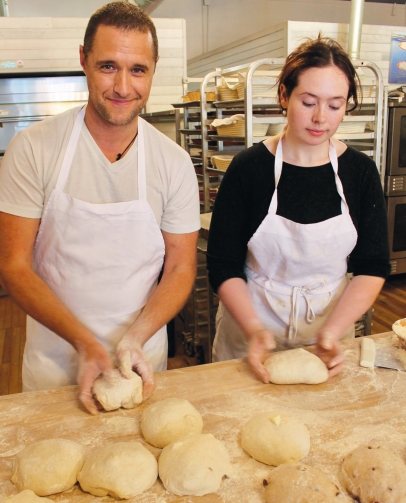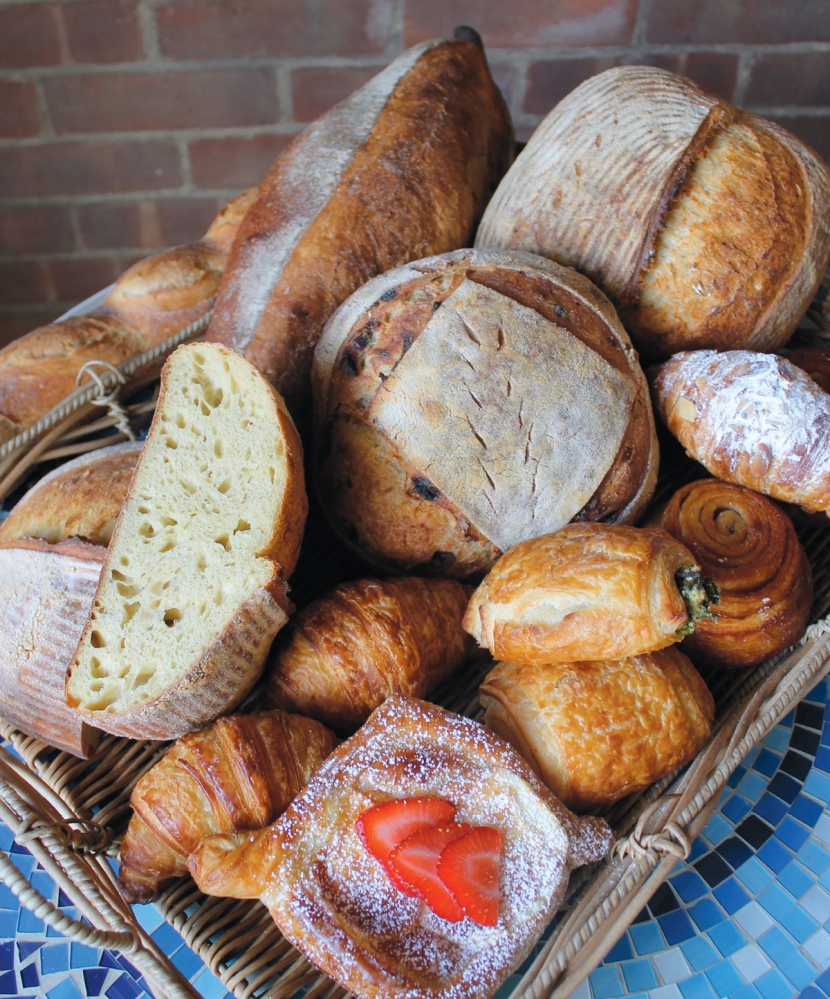Jeff Collins’ first brainstorm blew in after stints working in a restaurant and then selling cutlery. “What about baking?” this Johnson & Wales grad thought. “You work in the morning; you make what you make and you’re done!”
Inspired by a veteran Jewish baker in Brooklyn and buoyed by several bakery jobs in the Northeast, Jeff landed back in his hometown of Wakefield. He became the assistant manager for the bakery at Belmont Market, and it was there that he began to make his own bread as “Jeff’s Own.” He quickly developed a rapport with the customers who wanted to support “a local guy, trying his best,” in his words.
During the Covid lockdown, he decided to go out on his own, and that’s when the second brainstorm hit. He recognized the popularity of sourdough bread on the West Coast and also right here in Rhode Island, with Seven Stars Bakery. Thus, he began to study the process and opened South County Bread Co. in November 2020 (shortened to SoCo Bread by locals).
HOW SOUR DO YOU LIKE YOUR SOURDOUGH?
A slow fermentation for sourdough bread means that the sourdough starter is made with flour and water without adding lab-created yeast—just letting wild yeast from the air develop the beneficial bacteria (and bubbles) over hours or days. At SoCo Bread, the starter is mixed with more flour, water and other ingredients after just two or three hours, since Jeff feels that it’s reached the peak of flavor he’s seeking.
“It’s not all that sour yet—it’s very fresh,” he explains. “It will appeal to everyone.”
After the starter has been added to the other bread components, that mixture is set aside to rest while each of the varieties get its jolt of starter. By the time the bakers circle back to the first kind of bread, they begin to add salt, which takes 45 to 60 minutes, depending on the number of doughs they have assembled.
“How long you wait to salt your bread depends on what type of product you are going for,” he emphasizes. “We really like an open crumb, with lots of holes. I love the way it looks, feels in the mouth, the texture it makes.”
TAKING TIME FOR FULL FLAVORS TO FERMENT …
Next, all of the doughs go into a proofing time. After resting for approximately a half hour, each dough is stretched and folded to strengthen the gluten, then set aside again. After another half hour, this process is repeated and again after another half hour before they are weighed, put into baskets to keep their shape and put in the refrigerator overnight.
“That is the game-changer,” says Jeff, with a twinkle in his eye. “This is where the magic happens. Sourdough is completely reliant on time and temperature and it won’t over-proof [keep growing]. It will be fermenting and creating more flavor. After the cool overnight, it will have been roughly 16 to 18 hours.”
“That’s how you can get such robust flavors from seriously minimal ingredients,” he adds. “Flour, salt, water and starter. But also a heck of a lot of love, or time. Everyone has similar recipes—it’s just the timing and process that makes it different.”
The now-fermented breads are baked in a stone hearth oven with steam injected over them. That steam cooks them from the inside, giving them a special “oven spring,” while the heat makes the crispy crust. SoCo Bread gets Warthog Wheat from NEK Grains in Vermont, and grinds the whole berries daily. They get organic rye berries from Aurora Mills in Maine and sell five-pound bags of those two flours at the bakery.
THE EARLY BIRD GETS THE MORNING BUN!
All of the breads at SoCo use some unbleached flour, and all are sourdough-based, including the croissants and pie shells. Only the scones, cookies and muffins remain unfermented.
Specialty breads are made seasonally, and this is the third year that ancient grains come into their own at SoCo in the fall and winter: kamut, red fife or white Sonora wheat, sprouted spelt and others. The honey-oat kamut is an eagerly awaited variety.
The overwhelming pastry of choice is SoCo’s “morning bun.” The croissants are also considered among Rhode Island’s finest by foodies accustomed to European ones, with chocolate, almond, spinach-feta, ham-and-cheese and … the rare specialty: the Reuben croissant.
Other favorites are cranberry-nut bread (a satisfying blend of wheat and rye flours); country (another wheat-rye blend with heft to it); multi-grain (with several seeds and quinoa added to the flours) and ambrosia (apricots, raisins, nuts; this has been a winner since Jeff’s Belmont days).
From their first six months baking out of a local pizza shop (preorders and lines a block long) to their flagship spot on Wakefield’s Main Street, the Collins family’s enterprise has been a hit. Jeff credits wife Keri Lyn for the “scaffolding” of the business. They both agree that Jeff is “the hammer and nail, and Keri is the brains.”
Jeff used to fear that he’d be needed to run the business so much that he wouldn’t be able keep his hands (literally) in the bread making.
“But there’s always a place for me to fill in,” he notes with a smile. “And if you make things from scratch, people show up. Freshness counts.”
Johnette Rodriguez is a food, travel and arts writer published in Yankee, Saveur, the Boston Globe, SO Rhode Island and the Westerly Sun.
South County Bread Co.
333 Main St., South Kingstown
401.792.4303 or follow them @southcountybread







